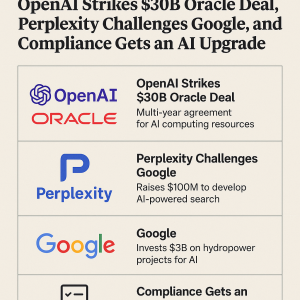The race to dominate the artificial intelligence stack is entering a critical new phase, marked by high-stakes partnerships, bold infrastructure investments, and rising challengers to long-standing incumbents.
In a landmark move, OpenAI has secured a $30 billion multi-year deal with Oracle, granting the ChatGPT creator access to massive computing resources through Oracle’s cloud infrastructure. The agreement positions OpenAI to maintain its leadership in generative AI by ensuring access to the scalable compute needed to train and deploy cutting-edge models.

The AI Stack Showdown: OpenAI Secures Compute, Perplexity Targets Search, Google Bets on Green Power, and Startups Reinvent Compliance — Who Will Own the Future of AI?
Oracle Chairman Larry Ellison, who has emerged as a key backer of OpenAI’s growth, described the deal as “a generational opportunity to build the future of AI infrastructure.” The partnership gives OpenAI dedicated access to Nvidia-powered clusters hosted across Oracle’s global data centers.
Perplexity AI Raises $100M to Challenge Google Search—Starting in India
While OpenAI fortifies its backend, Perplexity AI is aiming to disrupt the front-end of the internet—search. The startup, founded by former OpenAI researchers, just closed a $100 million funding round, bringing its valuation to over $500 million.
Perplexity’s product blends large language models with traditional search indexing to provide direct, citation-rich answers in real time. Now, the company is rolling out localized search for India’s 360 million internet users—one of the largest and fastest-growing digital markets globally.
CEO Aravind Srinivas says the goal is to “redefine what people expect from a search engine in the age of AI.” Perplexity’s expansion into India pits it squarely against Google’s core business in a strategically vital region.
Google Bets $3B on Hydropower to Fuel AI Growth
Meanwhile, Google is investing $3 billion into hydropower projects across North America and Europe, a strategic move to address the massive energy needs of its AI operations while aligning with climate goals.
The investment will fund next-generation energy storage systems and sustainable data center retrofits. According to insiders, the push toward renewable energy is aimed at keeping pace with AI compute demands while avoiding public and regulatory backlash tied to emissions-heavy growth.
“AI must be both powerful and sustainable,” said Google’s head of infrastructure. “Hydropower gives us the ability to scale with responsibility.”
Delve Turns Compliance Into a $300M AI Business
In a less visible but equally impactful corner of the AI landscape, Delve, a startup founded by MIT dropouts, is reinventing the compliance sector. By using AI agents to handle regulatory documentation, audits, and reporting, Delve is transforming compliance from a cost center into a revenue generator.
The company recently secured fresh funding, pushing its valuation to $300 million. Its tools are already being adopted by fintechs and multinational firms looking to automate complex regulatory workflows.
Delve’s approach reflects a broader trend: AI is no longer just about futuristic capabilities—it’s about solving today’s enterprise pain points at scale.
The Battle for the AI Stack Is Underway
From backend compute deals and clean energy infrastructure to search engine disruption and enterprise automation, the battle for AI supremacy is being waged on all fronts.
As OpenAI, Google, and rising startups like Perplexity and Delve race ahead, one thing is clear: the future of AI won’t be decided by models alone—it will be built on who owns the stack.




